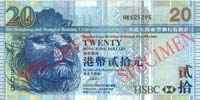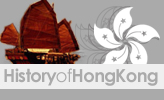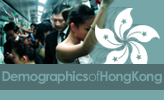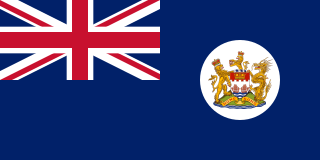Related Research Articles

Hong Kong, officially the Hong Kong Special Administrative Region of the People's Republic of China, is a special administrative region on the eastern side of the Pearl River estuary in southern China. With over 7.4 million people of various nationalities in a 1,104-square-kilometre (426 sq mi) territory, Hong Kong is the world's fourth most densely populated region.

Hong Kong Island is an island in the southern part of Hong Kong. It has a population of 1,289,500 and its population density is 16,390/km², as of 2008. The island had a population of about 3,000 inhabitants scattered in a dozen fishing villages when it was occupied by the United Kingdom in the First Opium War. In 1842, the island was formally ceded in perpetuity to the UK under the Treaty of Nanking and the City of Victoria was then established on the island by the British Force in honour of Queen Victoria.

The New Territories is one of the three main regions of Hong Kong, alongside Hong Kong Island and the Kowloon Peninsula. It makes up 86.2% of Hong Kong's territory, and contains around half of the population of Hong Kong. Historically, it is the region described in the Convention for the Extension of Hong Kong Territory. According to that treaty, the territories comprise the mainland area north of the Boundary Street of Kowloon Peninsula and south of the Sham Chun River, as well as over 200 outlying islands, including Lantau Island, Lamma Island, Cheung Chau, and Peng Chau in the territory of Hong Kong.

Hong Kong International Airport is the commercial airport serving Hong Kong, built on reclaimed land on the island of Chek Lap Kok. The airport is also colloquially known as Chek Lap Kok Airport (赤鱲角機場).

The Governor of Hong Kong was the representative in Hong Kong of the British Crown from 1843 to 1997. In this capacity, the governor was president of the Executive Council and Commander-in-Chief of the British Forces Overseas Hong Kong. The governor's roles were defined in the Hong Kong Letters Patent and Royal Instructions. Upon the end of British rule and the transfer of Hong Kong to the People's Republic of China in 1997, most of the civil functions of this office went to the Chief Executive of Hong Kong, and military functions went to the Commander of the People's Liberation Army Hong Kong Garrison.

The Hong Kong dollar is the official currency of the Hong Kong Special Administrative Region. It is subdivided into 100 cents. The Hong Kong Monetary Authority is the governmental currency board and also the de facto central bank for Hong Kong and the Hong Kong dollar.

Hong Kong Disneyland is a theme park located on reclaimed land in Penny's Bay, Lantau Island. It is located inside the Hong Kong Disneyland Resort and it is owned and managed by Hong Kong International Theme Parks. It is the largest theme park in Hong Kong, followed by Ocean Park Hong Kong. Hong Kong Disneyland opened to visitors on Monday, 12 September 2005 at 13:00 HKT. Disney attempted to avoid problems of cultural backlash by incorporating Chinese culture, customs, and traditions when designing and building the resort, including adherence to the rules of feng shui. For instance, a bend was put in a walkway near the Hong Kong Disneyland Resort entrance so good qi energy would not flow into the South China Sea.

The Hong Kong Film Awards, founded in 1982, is an annual film awards ceremony in Hong Kong. The ceremonies are typically in April. The awards recognise achievement in various aspects of filmmaking, such as directing, screenwriting, acting and cinematography. The awards are the Hong Kong equivalent to the American Academy Awards and the British BAFTAs.

The History of Hong Kong, a business port located off the south-east coast of China. Archaeological findings suggest that the region has been inhabited since the Old Stone Age, and later with its loose incorporation into the Chinese empire during the Qin dynasty. Starting out as a farming fishing village and salt production site, Hong Kong later evolved into an important free port and eventually a major international financial centre.

The Battle of Hong Kong, also known as the Defence of Hong Kong and the Fall of Hong Kong, was one of the first battles of the Pacific War in World War II. On the same morning as the attack on Pearl Harbor, forces of the Empire of Japan attacked the British Crown colony of Hong Kong. The attack was in violation of international law as Japan had not declared war against the British Empire. The Hong Kong garrison consisted of British, Indian and Canadian units besides Chinese soldiers and conscripts from both within and outside Hong Kong.

The Hong Kong national football team represents Hong Kong in international association football competitions such as the FIFA World Cup, AFC Asian Cup and East Asian Football Championship. The team is represented and supervised by the Hong Kong Football Association, the governing body for football in Hong Kong.
Hong Kong Airlines Ltd is an airline based in Hong Kong, with its headquarters in the Tung Chung district and its main hub at Hong Kong International Airport. It was established in 2006 as a member of the HNA Group.

Kitchee Sports Club is a Hong Kong football team based in Kowloon. It was founded in 1931 and currently competes in the Hong Kong Premier League. The Club has dominated football in Hong Kong in recent years. Since 2010, Kitchee has won the League titles six times in the last 8 years, while coming 2nd in the remaining 2 years. In the last 5 years, Kitchee won slightly more than 50% of all possible trophies being competed in Hong Kong. The club has won the Hong Kong Premier League three times in the League's 4-year history, the Hong Kong First Division six times, and the Hong Kong FA Cup four times in their history.

The Imperial Japanese occupation of Hong Kong (香港日據時期) began when the Governor of Hong Kong, Sir Mark Young, surrendered the British Crown colony of Hong Kong to the Empire of Japan on 25 December 1941. The surrender occurred after 18 days of fierce fighting against the overwhelming Japanese forces that had invaded the territory. The occupation lasted for three years and eight months until Japan surrendered at the end of Second World War. The length of this period (三年零八個月) later became a metonym of the occupation.

The transfer of sovereignty over Hong Kong, commonly known as the handover of Hong Kong, was the transformation of control over the United Kingdom's then colony of Hong Kong, pursuant to which it ceased to be a British Dependent Territory and became instead a special administrative region of the People's Republic of China on 1 July 1997. The returned territory comprised Hong Kong Island and the Kowloon Peninsula, which were respectively ceded to Britain in 1842 and 1860, as well as the New Territories, which were leased for 99 years from 1898. The transfer was arranged to coincide with the expiration of this lease on the previous day, 30 June 1997.

The Hong Kong Special Administrative Region Passport is a passport issued only to the permanent residents of Hong Kong who also hold Chinese citizenship. In accordance with the Basic Law of the Hong Kong Special Administrative Region, since the transfer of sovereignty on 1 July 1997, the passport has been issued by the Immigration Department of the Government of Hong Kong under the authorisation of the Central People's Government of the People's Republic of China. As the official languages of Hong Kong are Chinese and English, the passport is printed bilingually in both Chinese and English.

This is a list of films produced in Hong Kong ordered by decade and year of release in separate pages. For film set in Hong Kong and produced elsewhere see List of films set in Hong Kong.

Hongkongers, also known as Hong Kongese, are people who originate from Hong Kong. These terms are a special identity for those who hold the legal residency in Hong Kong. Most of the Hongkongers were born and bred, or at least bred in Hong Kong sharing the same set of core values of Hong Kong. The terms itself have no legal definition by the Hong Kong Government; more precise terms such as Hong Kong Permanent Resident and Hong Kong Resident are used in legal contexts. However, the word "Hongkonger" was officially added to the Oxford English Dictionary in March 2014.

British Hong Kong denotes the period during which Hong Kong was governed as a colony and British Dependent Territory of the United Kingdom. Excluding the Japanese occupation during the Second World War, Hong Kong was under British rule from 1841 to 1997. The colonial period began with the occupation of Hong Kong Island in 1841 during the First Opium War. The island was ceded by Qing China in the aftermath of the war in 1842 and established as a Crown colony in 1843. The colony expanded to the Kowloon Peninsula in 1860 after the Second Opium War and was further extended when Britain obtained a 99-year lease of the New Territories in 1898. Although Hong Kong Island and Kowloon were ceded in perpetuity, the leased area, which comprised 92 per cent of the territory, was vital to the integrity of Hong Kong that Britain agreed to transfer the entire colony to China upon the expiration of that lease in 1997. The transfer has been considered by many as marking the end of the British Empire.

Hong Kong independence is a movement that advocates Hong Kong becoming an independent sovereign state. Hong Kong is a special administrative region (SAR) which enjoys a high degree of autonomy under the People's Republic of China (PRC), guaranteed under Article 2 of Hong Kong Basic Law as ratified under the Sino-British Joint Declaration. Since the transfer of the sovereignty of Hong Kong from the United Kingdom to the PRC in 1997, some Hongkongers have been concerned about Beijing's growing encroachment on the territory's freedoms and the failure of the Hong Kong government to deliver "genuine democracy".